Industrial music is a genre of music that draws on harsh, mechanical, transgressive, or provocative sounds and themes. AllMusic defines industrial music as the "most abrasive and aggressive fusion of rock and electronic music" that was "initially a blend of avant-garde electronics experiments and punk provocation." The term was coined in the mid-1970s with the founding of Industrial Records by members of Throbbing Gristle and Monte Cazazza. While the genre name originated with Throbbing Gristle's emergence in the United Kingdom, artists and labels vital to the genre also emerged in the United States and other countries.

Cabaret Voltaire were an English music group formed in Sheffield in 1973 and initially composed of Stephen Mallinder, Richard H. Kirk, and Chris Watson. Named for the Zürich nightclub that fostered the early Dada movement, the band are often characterized as among the most innovative and influential electronic acts of their era.
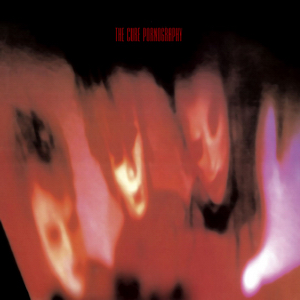
Pornography is the fourth studio album by English rock band the Cure, released on 4 May 1982 by Fiction Records. Preceded by the non-album single "Charlotte Sometimes", it was the band's first album with new producer Phil Thornalley, and was recorded at RAK Studios from January to April 1982. The sessions saw the band on the brink of collapse, with heavy drug use, band in-fighting, and frontman Robert Smith's depression fueling the album's musical and lyrical content. Pornography represents the conclusion of the Cure's early dark, gloomy musical phase, which began with their second album Seventeen Seconds (1980).
23 Skidoo are a British band playing a fusion of industrial, post-punk, funk, and world music.

Richard Harold Kirk was an English composer, musician and producer. Kirk is best known for his work in electronic music, and for co-founding the influential music group Cabaret Voltaire in 1973. As a solo artist, Kirk released music under his own name as well as under more than 30 aliases. He also collaborated with other artists in a range of groups such as Sweet Exorcist and Acid Horse.
Stephen William Mallinder is an English artist and musician who was a founding member of Cabaret Voltaire, and went on to work as Sassi & Loco, the Ku-Ling Bros., Hey, Rube!, Wrangler, and Creep Show.

Three Mantras is the second studio album by English band Cabaret Voltaire. It was released in May 1980 by Rough Trade.

Extended Play is an extended play and the debut release by English industrial band Cabaret Voltaire. It was released in November 1978, through record label Rough Trade.
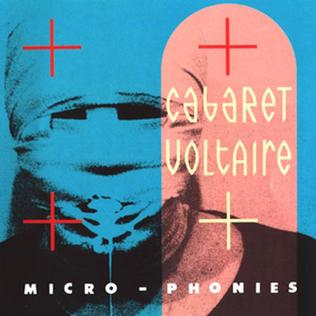
Micro-Phonies is the sixth full-length studio album by British electronic band Cabaret Voltaire. Released 29 October 1984, the album was the group's most mainstream release to date, with the singles "Sensoria" and "James Brown" gaining popularity, especially the former, due to the music video finding MTV airplay. The album sees Cabaret Voltaire continuing to change, pursuing the more electro and synthpop-oriented direction they had started shifting towards on The Crackdown.
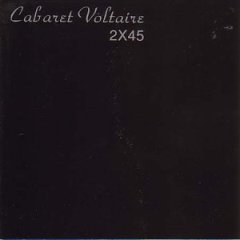
2x45 is the fifth studio album by English band Cabaret Voltaire. It was released in May 1982 through Rough Trade. This was the last studio album by the band to feature founding member Chris Watson, who had departed during its recording.

Mix-Up is the debut studio album by English band Cabaret Voltaire. It was released on 23 October 1979, through record label Rough Trade.

Live at the Y.M.C.A 27-10-79 is a live album by industrial/post-punk band Cabaret Voltaire, recorded in 1979 and originally released in 1980 by Rough Trade. It was re-released on CD in 1990 on Mute Records in the UK and on Restless Records in the USA. The album contains a cover of The Velvet Underground's "Here She Comes Now" from their album White Light/White Heat.

The Crackdown is the fifth studio album by English electronic band Cabaret Voltaire, released in August 1983 jointly through record labels Some Bizzare and Virgin. It was produced by the band themselves and Flood. Mixing their earlier experimental sound with more conventional dance rhythms, the album received positive reviews and was listed on NME's "Albums of the Year" in 1983.

A Factory Sample is a 7-inch double sampler EP released in January 1979 by Factory Records of Manchester, England. Funded by a small inheritance which had recently been bequeathed to Tony Wilson, it was the first vinyl recording to be released by the label. The cover of the EP is made of rice paper, dyed silver and sealed inside a thin plastic bag.
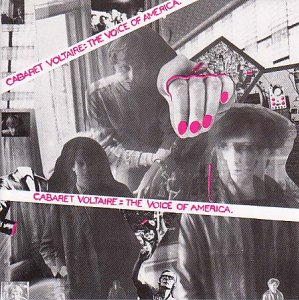
The Voice of America is the third studio album by English band Cabaret Voltaire. It was released in July 1980, through record label Rough Trade.

Hai! is a 1982 live album by the U.K. industrial band Cabaret Voltaire. It was recorded at the Tsubaki House in Tokyo, Japan on 23 March 1982, and was released on CD in 1991 by Mute Records Ltd. The original master tapes being lost, the CD was transferred from a vinyl copy.

Johnny Yesno: The Original Soundtrack from the Motion Picture is an album by industrial band Cabaret Voltaire. It was made as a soundtrack to Peter Care's film of the same title, which in turn led to Peter Care directing the video for Cabaret Voltaire's hit song "Sensoria". This started a music video-making career for Peter Care, who has since then directed videos for R.E.M., Bruce Springsteen, Roy Orbison, and Depeche Mode, amongst others.

Groovy, Laidback and Nasty is the ninth studio album by English electronic band Cabaret Voltaire, released in April 1990 by record label Parlophone.
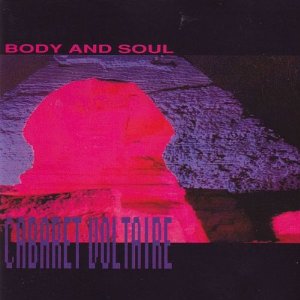
Body and Soul is the tenth studio album by English electronic band Cabaret Voltaire, released in March 1991 by Belgium-based label Les Disques du Crépuscule.

Shadow of Fear is the fifteenth and final studio album by English electronic music group Cabaret Voltaire, released on 20 November 2020 by Mute Records. The album was recorded and mixed at Western Works, which is the same studio that the band has used throughout their history. The album is Cabaret Voltaire's first and only release with Richard H. Kirk as the sole member of the band.

















